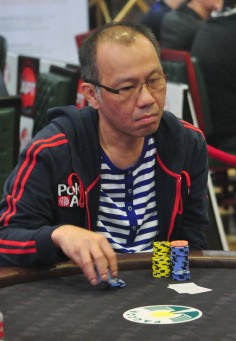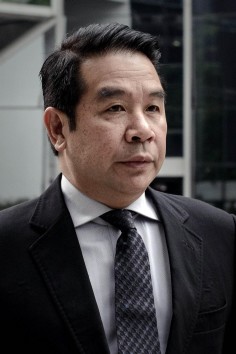
Hong Kong's back-room bookies go global thanks to online betting
Online gambling has transformed back-room Hong Kong bookies into global business behemoths, many with worrying links to organised crime

In the fragrant environs of the Mong Kok flower market, a florist leans on a delivery truck parked outside his shop, intently studying his smartphone. To the casual passer-by he looks every inch the typical cash-savvy Hong Kong shopkeeper, checking every last cent on the delivery invoice.

"For many low- and middle- class people here, this is the only thing they can do," he said, as he watched a co-worker cut thorns from roses. "What else can they do to get rich? It's a chance they take and, I tell you, 99 per cent of people lose."
Like tens of thousands of others in the city who love a flutter, the florist bets regularly online, even though he knows it's against the law. It has become almost like a mantra that the only place you can bet in Hong Kong is with the Hong Kong Jockey Club and a few licensed mahjong parlours. But it is an increasingly hollow mantra; the age of the internet has opened up a vastly lucrative and largely unregulated virtual world that would make casino mogul Sheldon Adelson blush.
In theory, the florist could go to jail for nine months for breaching the Gambling Ordinance, but he's not worried - the potential rewards are too tempting.
"The odds online are better than with the Jockey Club and they give you a week of credit," he said. "On Monday, they calculate your total. If you don't have the money, they have their own ways of getting it." His upper limit is HK$200,000 a month, he said.
The explosion in online gambling via websites, smartphone applications and online chat platforms has transformed back-room Hong Kong bookies and Macau junket operators into global business behemoths, many of them with deep and worrying links to organised crime, according to gaming regulators and industry watchdogs.
An investigation by the Sunday Morning Post, which looked at court documents from the US and Europe, company filings in registries across the world and interviews with gamblers, middlemen and virtual bookmaking kingpins has discovered that law enforcement agencies are struggling to contain what Martin Purbrick, the director of security at the Hong Kong Jockey Club, describes as "an international expansion and legitimisation of organised crime''.
Back in Mong Kok, the florist was browsing European soccer league odds on Sleepless City, one of the dozen betting websites he uses to place his illegal bets. The global scale of the business becomes apparent when you discover that the website's IP address can be traced to a computer server in Paris, while phone numbers on the site point to the Philippines, where many of Asia's gambling websites are based. Indeed, some of the world's largest online gambling sites operate legally from the Philippines on condition they don't accept domestic gamblers.
For Ingo Fiedler, an expert on online gaming laws at the University of Hamburg, issuing such licences is "deeply unethical".
"You'd have to make the distinction between what is legal and what is ethically acceptable," he said. "For a fee, they can offer their addictive products everywhere in the world except in the Philippines."
Under Hong Kong law, the operators of unlicensed websites offering bets to Hongkongers could face prison sentences of up to seven years. "The people running these websites could be arrested at almost every airport in the world," said Fiedler. "The real question is why this is not happening and the reason might be fear," he said.
Private investigators and law enforcement agents, speaking on condition of anonymity, have told the Post that online betting websites in Asia are often owned and run by organised criminals and there is growing concern locally that some of these websites are allowing the already huge profits made from traditional triad rackets like drug trafficking, protection, prostitution and people smuggling to be laundered in the form of bets.
"Look at it as a massive washing machine for proceeds of crime," one investigator said.
For Purbrick, much of the problem lies in the parallel world of traditional gaming in Macau, the vast flows of illicit money from the mainland and the junket operators who supply and collect the debts of the VIP high-rollers who are the lifeblood of Macau's gaming success.
"The increase in Macau's casino revenue and the continued reliance of casino operators on junkets to bring in customers from China ... has led to many people with triad and criminal backgrounds becoming millionaires,'' said Purbrick.
"What do these newly rich criminals do with their wealth? They diversify and invest internationally. Some Macau casino junkets have purchased mines and plantations in Southeast Asia, farms in Australia and vineyards in Europe and the US," he said.
Another line of business diversification that gangland's nouveau riche have turned to is online gaming, says Purbrick.
"The recent FBI case in Las Vegas clearly shows the linkage between major Asian illegal bookmakers who were arrested, Macau casino junkets, and organised crime groups in the form of various triad societies.
"This is a situation that needs to be understood by law enforcement agencies, gaming regulators, sports administrators, and governments at the policymaking level, who should be asking why casino junket companies that are connected to organised crime groups are investing in diverse businesses internationally and listing on stock exchanges," he said.

Phua and his son are currently on bail in Las Vegas facing illegal bookmaking charges, according to statements given by both men. Phua is either a shareholder or the owner of IBC Bet, one of the world's largest online gambling operations, which is licensed in the Philippines.
Phua and Richard Yong Seng-chen, who was also arrested in Las Vegas, held junket licences in Macau until earlier this year, when casinos requested to cancel their licences. In 2006, Phua was known as Macau's most successful junket operator.
Lawyers for Phua, 50, who until July held a San Marino diplomatic passport, have told the Post that their client "adamantly denies the allegations and will not dignify gossip and rumour with comment. Mr Phua will defend himself vigorously in court," they said.
The global penetration of online betting - and the murky world of soccer match fixing alongside which it coexists - is further illustrated by ongoing investigations into match fixing in Europe and in Singapore which have shed light on how criminal gangs have used Asian gambling websites to profit by rigging sport competitions around the world.
At least 20 investigations on match fixing are ongoing in Europe, the Post has learnt. "The high profits and the low sentences, if you get caught, have attracted persons from organised crime groups to the match fixing, and to maximise their profits they use all opportunities including illegal gambling websites," said Soren Pedersen, chief of media and public relations at Europol.
In Singapore, the alleged match-fixing ringleader Dan Tan Seet-eng has been held since October last year under a law that allows for indefinite detention due to the difficulty of finding evidence for match-fixing arrangements. The 50-year-old is wanted in Hungary and Italy for allegedly fixing dozens of soccer matches.
The largest of the investigations in Europe so far was in Germany in 2011 and saw Ante Sapina, a Croatian match fixer, jailed for five years. Prosecutors alleged that Sapina placed bets through employees of Samvo Entertainment, a London-based betting brokerage run by Hong Kong businessman Frank Chan Shung-fai, an influential figure in the New Territories, who counts among his roles being a member of the election committee for the chief executive, a member of the Heung Yee Kuk and a former part-time member of the Central Policy Unit.
Three of Samvo's employees knew about the rigged matches and placed their own bets on them, German prosecutors alleged after wiretapping Sapina. Samvo as a company has never been involved in any match fixing, a company representative told the Post. The company has been compliant with regulatory requirements and has "always co-operated to the full extent required by any investigations with regards to match fixing", the representative said. "To the best of our knowledge, none of our current employees is subject to any match-fixing investigations by any authority."
Some of Sapina's proceeds - about €500,000 (HK$4.5 million) - were laundered through a Hong Kong bank account, German prosecutors alleged. Sapina's lawyer did not reply to a request for comment. He is challenging the verdict.
Talking about the case, one European officer said he concluded match fixing had pushed co-operation between crime groups. "They look at where there are other crooks who can assist them," he said. "But one also has to be fair - not every match that one sees on the telly is fixed."
Life and crimes of Carson Yeung and how UK soccer authorities played ball
The English soccer authorities have come under fire in a book due to be published this week about the life and crimes of convicted Hong Kong businessman and Birmingham City FC boss Carson Yeung Ka-sing.
In their book, Haircuts and League Cups: The Rise and Fall of Carson Yeung, Will Giles and Daniel Ivery question how the Causeway Bay hairdresser-turned-multimillionaire was able to take control of the English club while he was under investigation for money laundering.
"We're very critical of the lack of due diligence conducted by authorities in the UK," said Giles. "The test in England to see if you are 'fit and proper' to become the director and/or owner of a club is a self-certifying form you fill in, submit and get rubber-stamped."
The criticism comes at a time of mounting concerns about the susceptibility of the sport to organised crime, such as match-fixing, illegal betting and money laundering.
Regulations for the Premier League and Football League - the second-tier set of leagues for the sport in the UK - mean any individual who wishes to become a director or owner of a club must complete a "fit and proper" test to verify the person has no criminal history.
However, for Giles and Ivery, the test is a "sop to the conscience of the authorities".
"It has been so ineffectual that only three people ever failed the test in its existence, with one of those beating it on appeal," the authors say in the new publication.
Currently serving a six-year prison sentence for money laundering, Yeung passed the test to become a director of Birmingham City FC in 2009 - even though he was already under investigation by Hong Kong police at that time.
Yeung also had a conviction dating back to 2004, when the former hairdresser-turned-businessman pleaded guilty before a magistrate to 14 counts of failing to disclose shares he owned in a listed company.
"The 2004 conviction is not an offence in the UK so he didn't have to disclose it, but if anyone dug just a little deeper they could have learned all about Yeung," said Giles.
"As it was, he was a shoo-in - exactly the type of international owner the Premier League and Football League desired to spread their 'brand' to the lucrative Asian market," say the authors.
Last season, the TV rights to the Premier League were worth about £1 billion (HK$12.7 billion), while the Football League Championship - the league below the Premier League - was worth around £65 million.
"With so much money awash in the game it has become a honey pot for investors looking for a quick buck," say Giles and Ivery.
"And with the additional element of business in international transfers which involve numerous unregulated intermediaries, you can easily understand why it would be attractive to money launderers."
Bryan Harris

